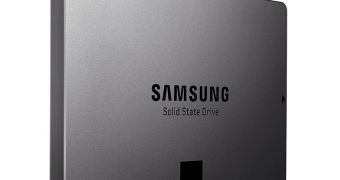Samsung may be better known for its smartphones, tablets, laptops, etc., but it is also a world-class chip developer that operates on both the CPU/SOC market and the NAND Flash storage industry.
In fact, its technologies are so advanced that it can already use 10nm-class chips for commercial purposes, despite some rivals still lingering at 16nm and 19nm.
It is those 10nm-class chips that have been used in the making of the latest solid-state drive series, dubbed 840 EVO.
The newcomers have a capacity of up to 1 TB, which is more than anyone could have hoped for just a year before.
The capacity is achieved thanks to the ability of each NAND chip to cram 128 Gb of storage space.
Capacity isn't the only asset though. Samsung's SSD can also boast of having a good transfer speed, of 410 MB/s when writing and 520 MB/s when reading, and that's just for the low-capacity drives.
The 1 TB model can achieve 540 MB/s and 520 MB/s, respectively and, on a related note, random 4K performance of 98,000 (read) and 90,000 (write).
As some may notice, the performance gap between low-capacity and high-capacity SSDs has been narrowed.
"After accelerating the growth of the SSD market by last year's launch of entry-level, high-performance SSDs we are introducing a much faster SSDs with up to 1 TB capacities offering consumers a wider range of choices," said Young-Hyun Jun, executive vice president, memory sales & marketing, Samsung Electronics.
"Samsung continues to enhance its SSD brand image by delivering the industry's highest quality solutions and continuously increasing its SSD market share by expanding the adoption of higher density SSDs especially in client PC segments."
Samsung's 840 EVO SATA-based solid-state drives haven't been priced, but they should sell soon. The capacity options will be of 120 GB, 250 GB, 500 GB, 750 GB and 1 TB.

 14 DAY TRIAL //
14 DAY TRIAL //